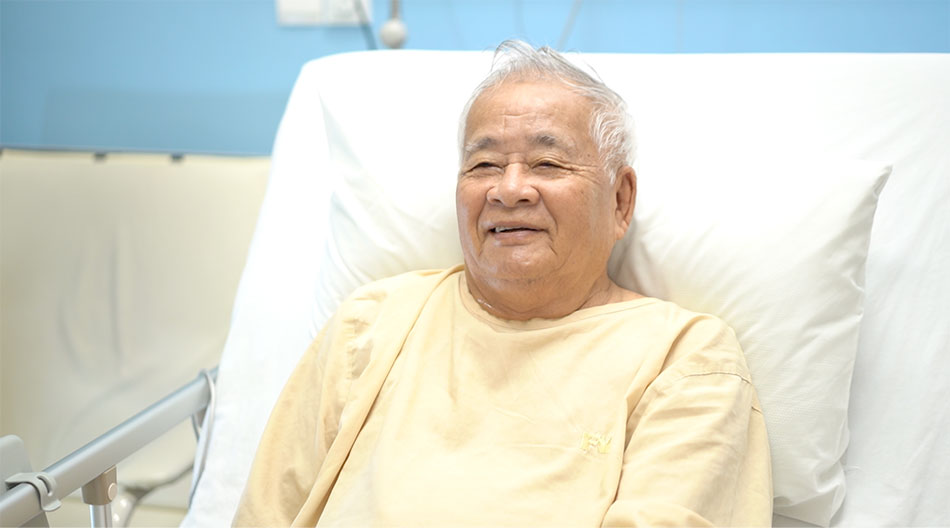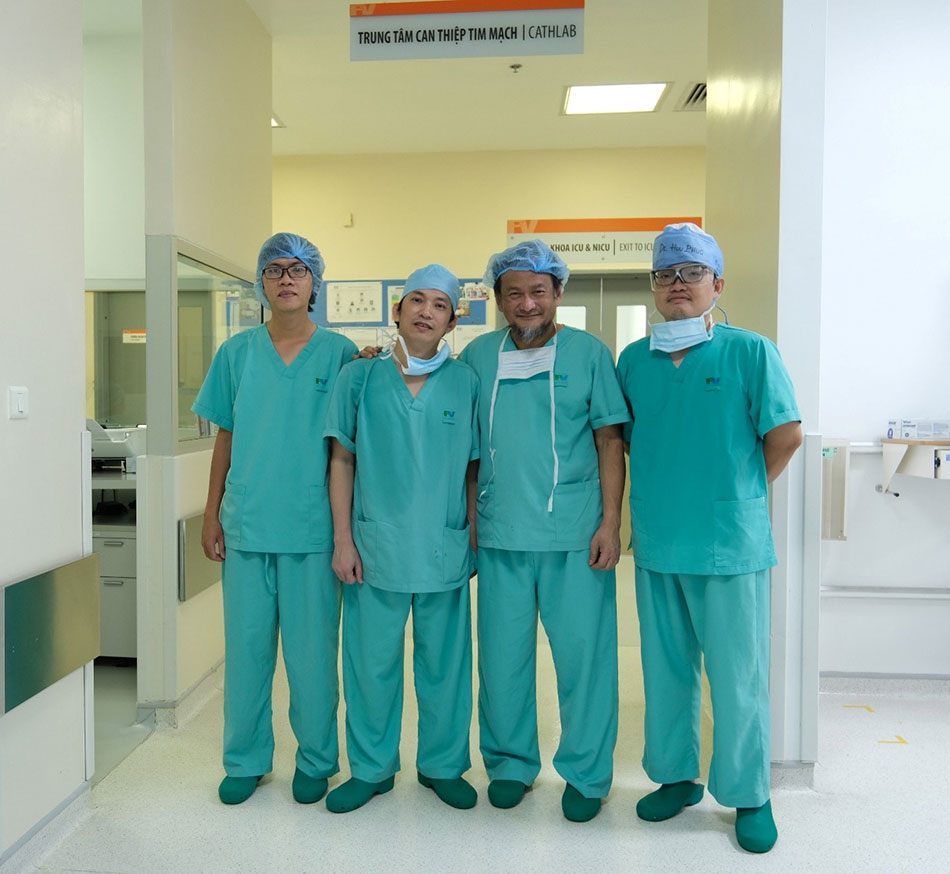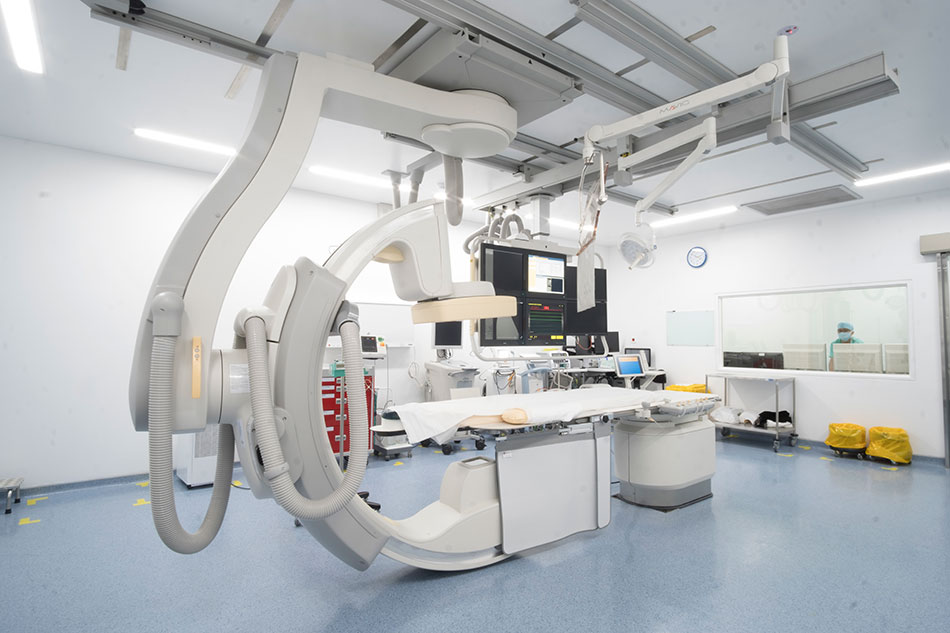FV Hospital is currently implementing the transcatheter aortic valve implantation (TAVI) technique to treat aortic valve stenosis. TAVI is a procedure that can replace traditional open-heart surgery with outstanding advantages, such as requiring only local anaesthesia and intervention through the skin, minimising risk of complications, reducing the duration of treatment and recovery time for patients.
The transcatheter aortic valve implantation (TAVI) is a modern technique practiced in many countries, including Vietnam. As one of the few cardiac centres in Vietnam capable of implementing this advanced technique, FV Hospital hopes to create opportunities to save the lives of many cardiac patients, especially those who are elderly, in poor health, and have multiple comorbidities that make open-heart surgery unfeasible. During the initial phase of implementing the TAVI technique, FV will receive support from specialist Datuk Dr Rosli Mohd Ali from Malaysia.
FV successfully performed transcatheter aortic valve implantation (TAVI) for an 83-year-old patient.
Mr Le Van Hong (83 years old, Ho Chi Minh City) had previously received a stent. However, over the past few months, he experienced worsening shortness of breath and chest tightness and pain daily, even when walking short distances of a few hundred metres. Imaging and tests revealed severe narrowing of the patient’s aortic valve, and medication-based intervention was no longer effective. According to Ho Minh Tuan, MD, PhD, Head of the Cardiology Department at FV Hospital, in this case, replacing the heart valve is essential to save the patient’s life. The safest method for this patient is a transcatheter aortic valve implantation (TAVI) procedure, as the mortality rate with open-heart surgery is much higher.
TAVI (transcatheter aortic valve implantation) — a method of replacing the aortic valve through the skin — has been widely used in many countries worldwide, and some major centres in Vietnam have also adopted this technique. “The advantage of this method is its speed, effectiveness, and safety, avoiding open-heart surgery for the patient,” explained Dr Tuan.

With the TAVI technique, the patient’s aortic valve is replaced without the need for open-heart surgery.
Dr Tuan and the surgical team completed the surgery in two hours, assisted by Datuk Dr Rosli Mohd Ali – an experienced specialist in implementing the TAVI technique and a former director of the National Heart Institute of Malaysia (IJN) and Head of the Cardiology Department at CVSKL Kuala Lumpur Hospital. Using a small catheter, doctors inserted a new valve into the patient’s heart through an artery in the leg, replacing the natural aortic valve. This process was guided by ultrasound and an advanced digital subtraction angiography (DSA) system.
“Immediately after surgery, the patient underwent functional recovery sessions conducted by technicians to engage in physical therapy, restoring cardiac function. Three days later, the patient was able to walk and exercise normally and was ready for discharge,” said Dr Tuan.

Patient Le Van Hong recovered well and was discharged after three days following the aortic valve replacement surgery using the TAVI technique.
“I am the first patient to undergo aortic valve replacement using the TAVI method at FV Hospital. When the doctor discussed this technique with me instead of open-heart surgery, I agreed right away because I have full confidence in the expertise of the doctors at FV Hospital. After the surgery, my health recovered well. I am very happy to receive such attentive and professional treatment and care from the medical staff at FV Hospital,” expresses Mr Hong before his discharge on November 15th.
Expanding Lifesaving Opportunities For Aortic Valve Stenosis Patients Through TAVI Technique
Aortic valve stenosis is a condition where the heart valve cannot fully open, obstructing the flow of blood from the heart to the body. It is a common cardiac condition, affecting approximately two to five per cent of people aged 65 and older and 30 per cent of individuals over 75. Patients with aortic valve stenosis face a 40 per cent risk of mortality within a year if they do not undergo intervention to replace the malfunctioning valve.
Previously, the standard treatment method for aortic valve stenosis was open-heart surgery: the patient’s chest was opened, the heart was stopped, and then surgeons replaced the natural aortic valve with an artificial valve. However, this method had several limitations: it involved lengthy surgery, a high risk of complications, a long recovery period, and was not suitable for elderly patients or those with underlying health issues such as diabetes, coronary artery disease, kidney failure, or lung disease.
Recently, Transcatheter Aortic Valve Implantation (TAVI) has emerged as a medical breakthrough, providing a lifeline for aortic valve stenosis patients. This method offers numerous advantages: it can be performed on elderly patients with comorbidities, a faster recovery time, and avoids risks associated with complications like infections, bleeding, or heart failure.

Ho Minh Tuan, MD, PhD, and Datuk Dr Rosli Mohd Ali (second and third from the left, respectively) and members of the cardiac surgery team at FV Hospital.
“Currently, TAVI is performed in many countries, including Vietnam, offering an opportunity to save the lives of many patients with aortic stenosis,” explained Dr Tuan.
Dr Tuan further mentioned that TAVI is highly sophisticated and a leading complex intervention in endovascular procedures. Therefore, it can only be implemented in a few large cardiac centres equipped with the necessary infrastructure and a team of highly skilled doctors. According to Dr Tuan, FV Hospital is among the few hospitals in Vietnam with the capacity to carry out this technique, thanks to its modern Cathlab facilities, continuous updates on machinery and new techniques, along with an experienced team of doctors proficient in the latest cardiovascular technologies. During the initial phase of implementing the TAVI technique, cases at FV Hospital will be supported by the expertise of Datuk Dr Rosli Mohd Ali from Malaysia.
Dr Tuan, Head of the Cardiology Department at FV, also added that TAVI might be considered a promising procedure in the near future, providing life-saving opportunities for many patients with aortic stenosis, especially the elderly and those with multiple underlying conditions for whom traditional valve replacement methods are not suitable.

FV Hospital is equipped with a Cathlab room furnished with state-of-the-art machinery.
For more information about the transcatheter aortic valve implantation (TAVI) technique, please contact: (028) 54 11 33 33.



